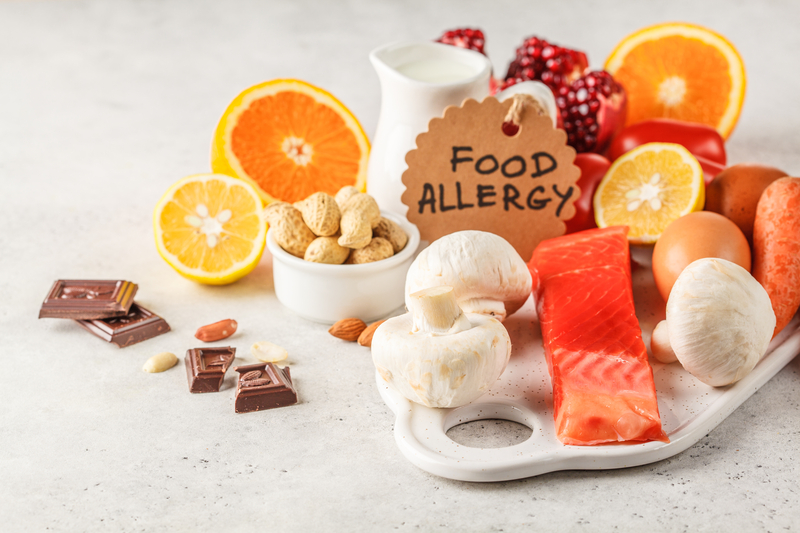Understanding Food Allergies and Intolerances: Critical for a Healthy Journey
Embarking on a journey to understand food allergies and intolerances is an empowering step towards taking control of your health. In this comprehensive guide, we will delve into the world of food allergies and intolerances, unraveling the mysteries behind these conditions. Gain valuable insights into the importance of understanding food allergies and intolerances, learn about common triggers, discover how to identify potential culprits, and explore effective strategies to manage symptoms while maintaining a healthy and enjoyable diet.
Why Understanding Food Allergies and Intolerances Matters: Understanding food allergies and intolerances is critically important for several reasons:
- Safety and Well-being: For individuals with food allergies, consuming even a small amount of a trigger food can lead to severe and potentially life-threatening reactions. Anaphylaxis, a severe allergic reaction, can cause difficulty breathing, swelling, and a drop in blood pressure, requiring immediate medical attention. Delayed or unrecognized allergies and intolerances can also lead to chronic health issues, such as digestive problems, skin conditions, and respiratory disorders. By understanding your specific allergens or intolerances, you can effectively manage your diet and avoid triggering foods, reducing the risk of adverse reactions.
- Accurate Diagnosis and Medical Treatment: Understanding the symptoms and triggers associated with food allergies and intolerances can help you seek accurate diagnosis from healthcare professionals. By providing detailed information about your symptoms and dietary patterns, you can assist in the diagnostic process and receive appropriate medical advice and treatment. A proper diagnosis allows you to better manage your condition, access necessary medications like epinephrine auto-injectors for severe allergies, and receive personalized guidance from healthcare professionals.
- Avoiding Cross-Contamination: Being aware of food allergies and intolerances allows you to navigate potential sources of cross-contamination. For example, individuals with gluten intolerance need to avoid cross-contact with gluten-containing products during food preparation. By understanding the risks of cross-contamination, you can take necessary precautions, such as using separate utensils, cleaning surfaces thoroughly, and being mindful of shared cooking environments.
- Nutritional Adequacy: Many common food allergens and intolerances are sources of important nutrients. Eliminating certain foods from your diet without proper substitution may lead to nutrient deficiencies. By understanding your dietary restrictions, you can work with healthcare professionals or registered dietitians to ensure you receive adequate nutrition from alternative sources. This knowledge helps you maintain a balanced and wholesome diet that supports your overall health and well-being.
- Personalized Meal Planning: Understanding your food allergies and intolerances enables you to create personalized meal plans that suit your unique needs. By identifying trigger foods and finding suitable alternatives, you can enjoy a diverse and satisfying diet without compromising your health or well-being. Meal planning becomes more efficient, as you focus on safe and nutritious options, reducing the risk of accidental exposure to allergens or triggers.
- Social Inclusion and Empathy: Educating yourself about food allergies and intolerances fosters a culture of inclusion and empathy. By understanding the challenges faced by individuals with dietary restrictions, you can support their needs and create a more inclusive environment in social settings, restaurants, and other food-related events. This knowledge promotes empathy and helps build a community that respects and accommodates diverse dietary needs.
The Consequences of Neglecting Food Allergies and Intolerances: Neglecting or dismissing food allergies and intolerances can have serious consequences. Ignoring potential triggers and failing to manage your diet appropriately can lead to:
- Increased Health Risks: Continued exposure to trigger foods can result in recurrent allergic reactions, inflammation, gastrointestinal issues, skin problems, and respiratory difficulties. Over time, these conditions may worsen and impact your overall health and well-being.
- Reduced Quality of Life: Untreated food allergies and intolerances can significantly impact your quality of life. Frequent allergic reactions or ongoing digestive problems can disrupt your daily activities, hinder social interactions, and limit your ability to enjoy meals without worry.
- Nutritional Deficiencies: Ignoring dietary restrictions and failing to replace eliminated foods with suitable alternatives can lead to nutrient deficiencies. Inadequate intake of essential vitamins, minerals, and other nutrients can compromise your overall health and leave you vulnerable to various health problems.
- Emotional and Psychological Impact: Dealing with food allergies and intolerances can take a toll on your mental and emotional well-being. Constant vigilance, the fear of accidental exposure, and the need to navigate social situations can contribute to stress, anxiety, and feelings of isolation.
Understanding food allergies and intolerances is a vital step in managing your health and well-being. By gaining insights into the importance of understanding these conditions, recognizing common triggers, identifying potential culprits, and implementing effective strategies, you can navigate food allergies and intolerances with confidence. Empower yourself to make informed choices, seek professional guidance, and embrace a healthy and inclusive lifestyle. Let your journey towards understanding food allergies and intolerances be a catalyst for personal growth, improved well-being, and a greater understanding of the diverse needs within our community.



